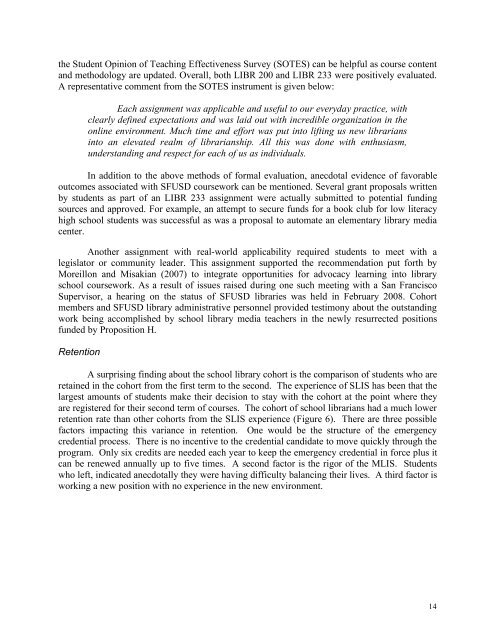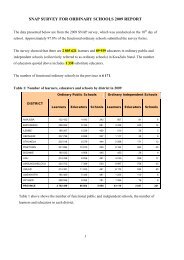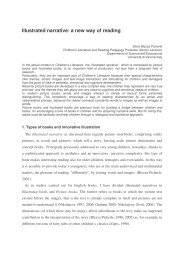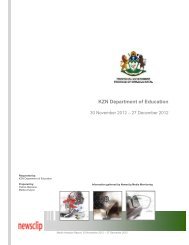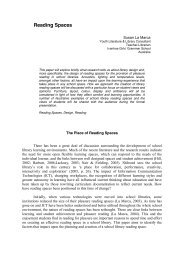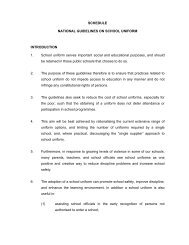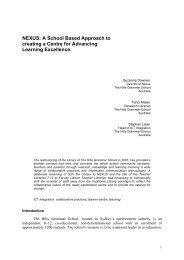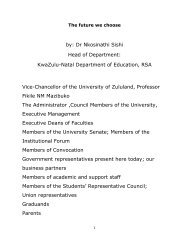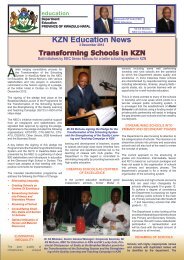Using Technology to Prepare World Class School Librarians to ...
Using Technology to Prepare World Class School Librarians to ...
Using Technology to Prepare World Class School Librarians to ...
You also want an ePaper? Increase the reach of your titles
YUMPU automatically turns print PDFs into web optimized ePapers that Google loves.
the Student Opinion of Teaching Effectiveness Survey (SOTES) can be helpful as course content<br />
and methodology are updated. Overall, both LIBR 200 and LIBR 233 were positively evaluated.<br />
A representative comment from the SOTES instrument is given below:<br />
Each assignment was applicable and useful <strong>to</strong> our everyday practice, with<br />
clearly defined expectations and was laid out with incredible organization in the<br />
online environment. Much time and effort was put in<strong>to</strong> lifting us new librarians<br />
in<strong>to</strong> an elevated realm of librarianship. All this was done with enthusiasm,<br />
understanding and respect for each of us as individuals.<br />
In addition <strong>to</strong> the above methods of formal evaluation, anecdotal evidence of favorable<br />
outcomes associated with SFUSD coursework can be mentioned. Several grant proposals written<br />
by students as part of an LIBR 233 assignment were actually submitted <strong>to</strong> potential funding<br />
sources and approved. For example, an attempt <strong>to</strong> secure funds for a book club for low literacy<br />
high school students was successful as was a proposal <strong>to</strong> au<strong>to</strong>mate an elementary library media<br />
center.<br />
Another assignment with real-world applicability required students <strong>to</strong> meet with a<br />
legisla<strong>to</strong>r or community leader. This assignment supported the recommendation put forth by<br />
Moreillon and Misakian (2007) <strong>to</strong> integrate opportunities for advocacy learning in<strong>to</strong> library<br />
school coursework. As a result of issues raised during one such meeting with a San Francisco<br />
Supervisor, a hearing on the status of SFUSD libraries was held in February 2008. Cohort<br />
members and SFUSD library administrative personnel provided testimony about the outstanding<br />
work being accomplished by school library media teachers in the newly resurrected positions<br />
funded by Proposition H.<br />
Retention<br />
A surprising finding about the school library cohort is the comparison of students who are<br />
retained in the cohort from the first term <strong>to</strong> the second. The experience of SLIS has been that the<br />
largest amounts of students make their decision <strong>to</strong> stay with the cohort at the point where they<br />
are registered for their second term of courses. The cohort of school librarians had a much lower<br />
retention rate than other cohorts from the SLIS experience (Figure 6). There are three possible<br />
fac<strong>to</strong>rs impacting this variance in retention. One would be the structure of the emergency<br />
credential process. There is no incentive <strong>to</strong> the credential candidate <strong>to</strong> move quickly through the<br />
program. Only six credits are needed each year <strong>to</strong> keep the emergency credential in force plus it<br />
can be renewed annually up <strong>to</strong> five times. A second fac<strong>to</strong>r is the rigor of the MLIS. Students<br />
who left, indicated anecdotally they were having difficulty balancing their lives. A third fac<strong>to</strong>r is<br />
working a new position with no experience in the new environment.<br />
14


